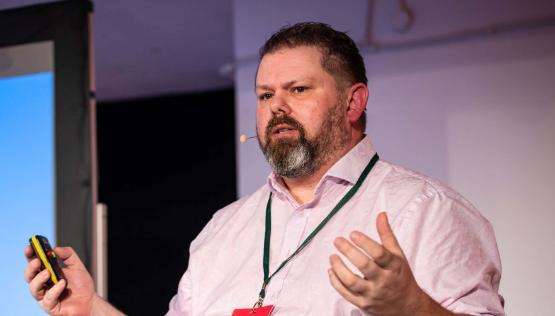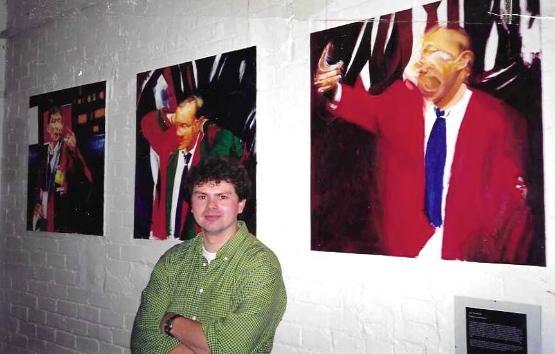Q&A with Dr Rob Wilmot
Tech entrepreneur, and University of Bradford alumnus, Rob Wilmot is the CEO of online idea management platform Crowdicity and was previously one of the three founding executives of UK internet service provider, Freeserve. Following the creation of Freeserve, he became one of the youngest ever executive officers of a FTSE 100 company at the age of 29.
Rob completed his degree in BSc Electronic Imaging and Media Communications in 1994. Since then, he has been involved in supporting the University and recently made a significant gift towards the Bradford Futures Fund which has enabled us to establish a ten-year programme of scholarships to support students through the fund untill at least 2031/32.

Dr Rob Wilmot
How did the University of Bradford play a part in your life and career?
I came to university as a mature student, having decided to get a job after my A Levels. I had won a place at art college but had to give this up because I just couldn’t afford the cost of materials and travel. However, having worked for a couple of years in local government as a housing and community charge benefits assistant, I felt that I had saved enough to continue my education.
Art college, architecture, and archaeology all seemed like interesting choices - and I got offered places at colleges and universities for all of these. But then I just happened to wander over to the education resources centre on my lunch hour and was casually flicking through a prospectus for the University of Bradford when I came across a course which was described as colliding artists and technologists together to create graduates with the skills needed to service the emerging digital economy. Added to this, it was a BSc Honours degree, which appealed to my contrary outlook on life as my A Level tutor had always expected I would pursue a BA.
The course was Electronic Imaging and Media Communications, and it was truly groundbreaking. One day you would be studying computer science and the next you would be writing a thesis on the dystopian future of science fiction. I was given access to the very latest in computer, video, and music technology. The course was modular and incredibly flexible in the interpretation of the project work, which suited my way of learning. I’m autistic and the ability to do so much experimentation and development outside of the prescribed curriculum unlocked my creativity and allowed me to thrive.
As a direct result of my experience as a student at the University of Bradford and as a resident of the city, I have led a wonderfully diverse life and achieved some significant high points in my career. This included; my work as a digital artist winning the IBM European Leonardo da Vinci Award for Multimedia at the age of 25, becoming one of the youngest executive officers of a FTSE 100 company with Freeserve, one of the UK’s first Unicorns at the age of 29, and serving as a top-level civil servant in the UK as Her Majesty’s Crown Representative for Software and as a NED in central government. I’ve founded, served as CEO, and invested in several other tech companies - the most recent being Crowdicity, the collective intelligence platform which I sold to Medallia, inc., a NYSE listed company based in San Francisco. I’m now splitting my time between being an artist, angel investor, mentor and advisor supporting mainstream and underrepresented new talent.

Dr Rob Wilmot aged 26, pictured 2 years after graduating from the University of Bradford having earned a BSc in Electronic Imaging & Media Communications in 1994.
How did you become interested in supporting students?
I was approached by the Alumni team who told me about the Bradford Futures Fund and how it would help underrepresented and underprivileged students to afford the living costs of attending the University. This struck a chord with my own experience of struggling to pay for food whilst at university. Back then the University came to my aid through a payment from the student hardship fund. This literally saved me from having to drop out, and so it was a relatively easy decision for me to pledge an initial £10,000.
It was serendipitous that on the evening before I contacted the University to make the donation, I had an affirming moment whilst listening to a Prince song with the lyrics “What's the use of money if you ain't gonna break the mould?” - and that just sealed the deal for me.
What motivated you to become involved in funding the Bradford Futures Fund Scholarships?
I had always planned to donate more to the University as part of my plans for my philanthropic giving. In order to explore this, the Alumni team arranged for me to meet with a recipient of a scholarship, and to speak with the Vice-Chancellor about Bradford’s mission. It was as a direct result of this deeper insight and understanding that the profound impact of the Bradford Futures Fund really landed with me. It became very clear that donating a further £50,000 would provide sustainable funding that would literally change multiple lives for the better.
What do you hope the impact will be on the recipients of these scholarships?
I’m hopeful that some great talent will be made available to the world, where it might otherwise have remained as unrealised potential. I’m hoping those from underrepresented backgrounds such as Asian women and neurodiverse students will be able to take advantage of the Futures Fund to make a real difference in their lives and the lives of those in their families, communities, and society in general.
You have also helped the University by giving your time, insight, and experience to support certain projects. Why have you decided to be involved in these ways?
I have been involved with the University ever since I graduated in 1994. For several years I was an Honorary Fellow associated with Electronic Imaging and Media Communications at Bradford where I helped shape the curriculum and provided mentorship for the students. I also hired many of the graduates in the mid to late nineties and early noughties into several technology ventures I was instrumental in. This was testament to the quality curriculum of the course that produced graduates with the skills needed to service the emerging digital economy.
I have also been involved with the Business School giving an entrepreneurial perspective in talks to students. With the help of the Alumni team, I have recently re-engaged with the School with a view to giving advice on their new plans around entrepreneurialism, as well as giving talks and offering further advice as needed.
What would be your message to anyone who may be considering making a gift towards Bradford?
I feel a deep sense of gratitude towards the University of Bradford for unlocking my talent and encouraging me to thrive in my life and career. I appeal to my fellow alumni to reflect on how much they have gained from their association with the University and, like me, to show their gratitude by donating what they can to help support a generation of new talent and research.
